
Activists at the UKIP spring conference have just been asked how much they want Britain to leave the EU, on a scale of 1 to 10. “Six? Seven? Eight? Nine?” Richard Murphy, head of field campaigning at Grassroots Out (GO), asks the half-filled hall in Llandudno, north Wales. Hands stay resolutely down. “Ten?” There are loud cheers and a sea of hands reach into the air. “Eleven!” shouts one excited delegate, getting to his feet.
"I just want you to bear that in mind,” Murphy says. "Because do you seriously believe that the BSE [Britain Stronger in Europe] campaign will have anybody that would stick their hand up at ten, nine, eight, seven? We have the passion and belief on our side and they don’t.” This is the final session of the day-long conference, when the "Kippers" get down to the nitty gritty of just how exactly they’re going to convince Britons to vote Leave in the 23 June referendum.
UKIP leader Nigel Farage has thrown his weight behind GO – which styles itself as an anti-elitist group reaching out to ordinary voters – but has insisted that it’s a cross-party movement with plenty of Tory and Labour support. UKIP know they need the support of other parties to secure a Leave vote in the referendum. Awkwardly, UKIP’s only MP, Douglas Carswell, backs rival campaign group Vote Leave, along with the five Tory cabinet ministers fighting for Out.

The two groups are locked in battle to be crowned the official Leave group by the Electoral Commission, a title that unlocks £600,000 of public funds, TV broadcasts, and a £7 million spending limit. GO isn't "posh enough" for Vote Leave supporters, Farage pointedly told journalists at the conference on Saturday.
GO was formed in January as a result of in-fighting between Vote Leave and Leave.EU. Now Leave.EU has thrown in its lot with GO, forming an umbrella group that’s officially known as the GO Movement. And even if it doesn’t win the official designation, it will keep on campaigning right to the end.
This Saturday 5 March will see its biggest action day yet. “Anyone who’s going to the races, going on holiday, getting married – cancel it!” deputy campaigning chief John Flack says. The crowd roars with laughter. "Next Saturday is going to be the biggest single coordinated action day in the history of referendums in the UK, without a doubt!"
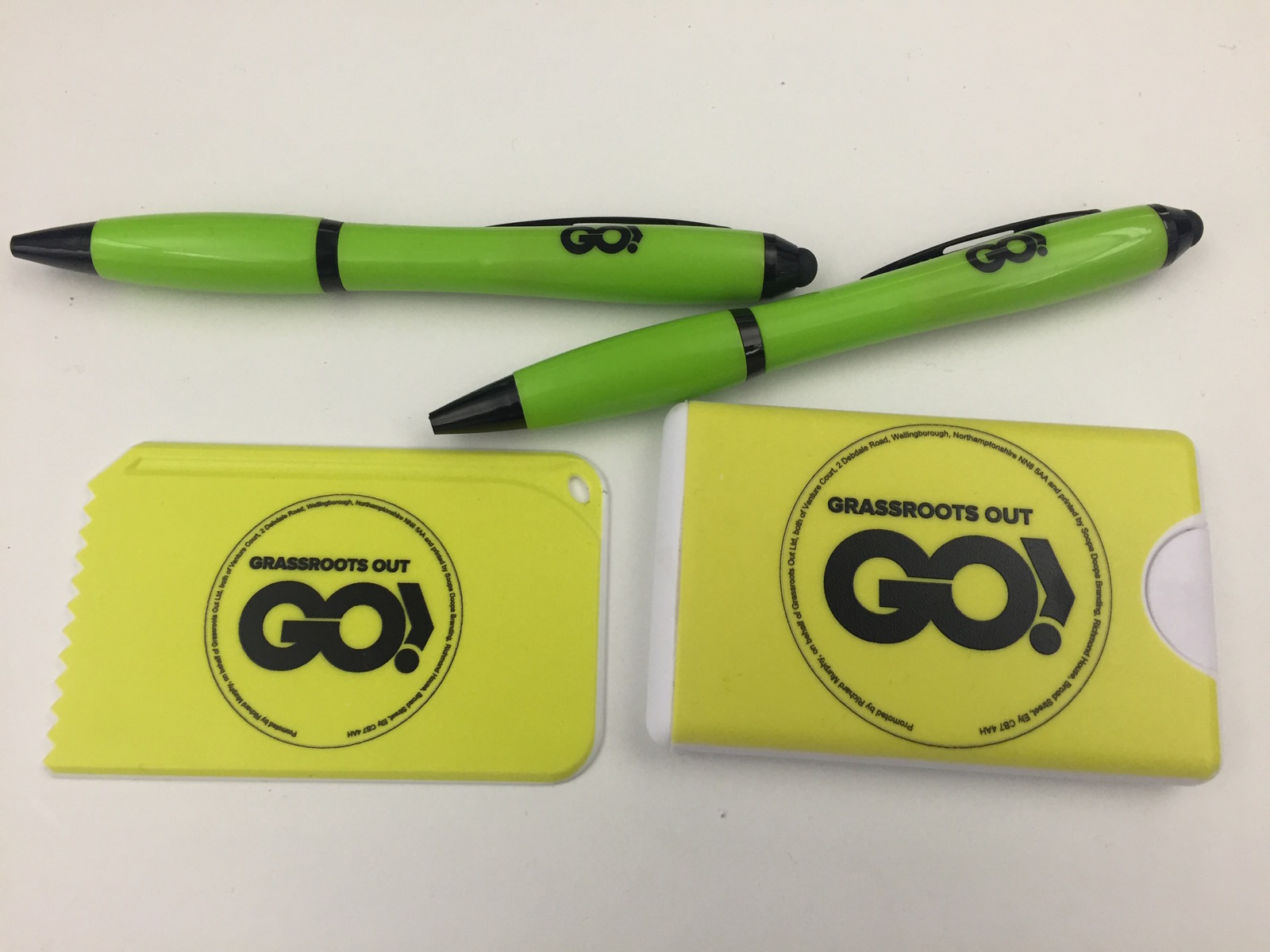
The aim is to get 500 street stalls in place across the UK, including in David Cameron’s Witney constituency. Local organisers have been sent GO-branded, luminous green tablecloths, helium balloons, raincoats, T-shirts, pens, mints, and Post-It notes. UKIP members are urged to take photos and “tweet and email them”.
But there’s a warning. “We’re asking you to take off your party colours and not to put other literature on the stand,” Flack says. "You’ve got a party to be proud of but on this occasion we’re all GO. We’ll also be feeding people to you who have no party allegiance whatever.” The message is clear – it's a bright green day not a purple one.
Murphy runs through the campaign’s strategy leading up to polling day and is adamant that victory is “all down to organisation”. He says: "I am convinced that there will be constituencies where the Stay side have more supporters than we do but if we are organised better and get out our vote better, we will still win that constituency."
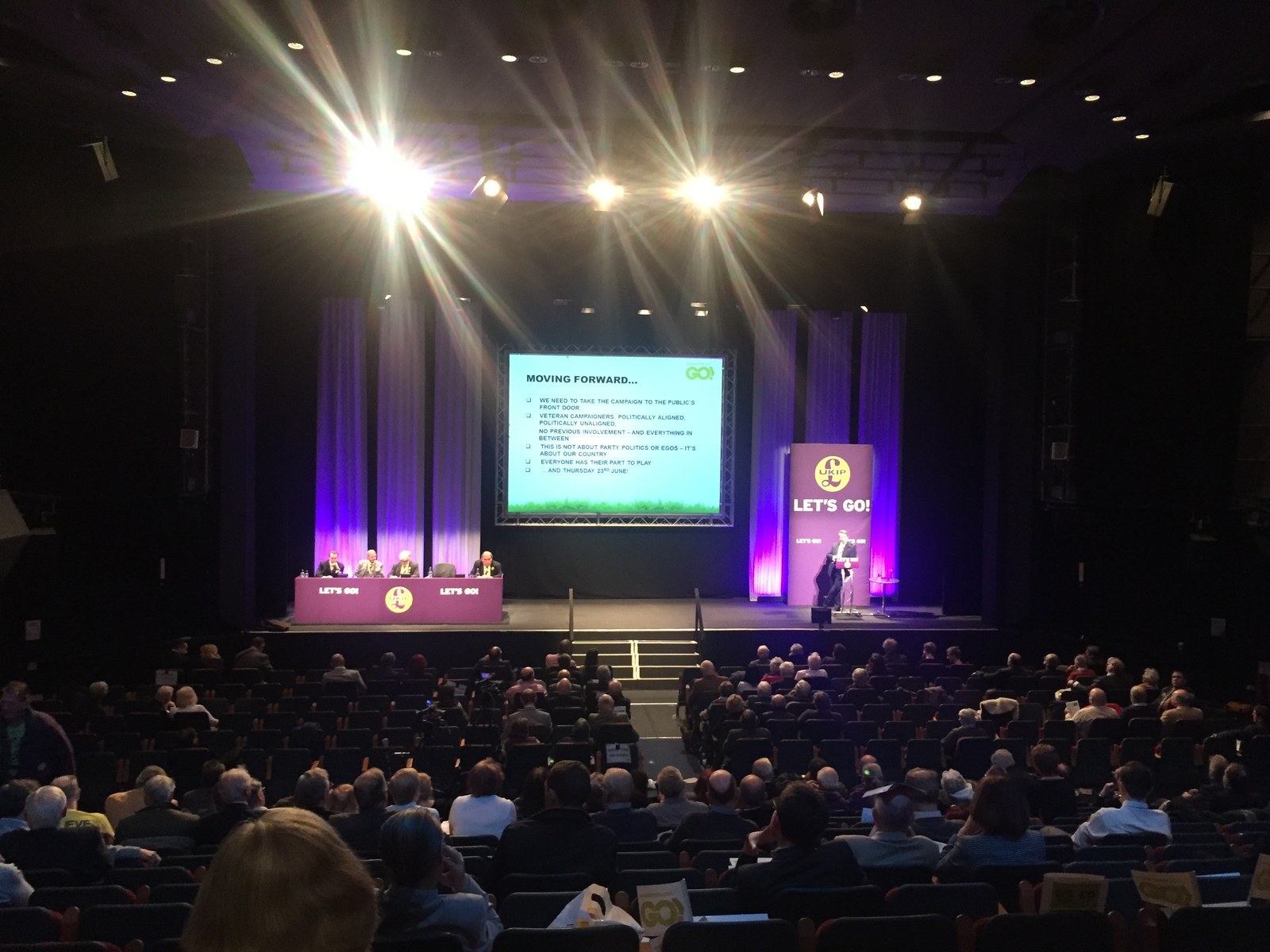
In fact GO organisers seem to have drawn a lot of inspiration from an unlikely place – the Liberal Democrats. Murphy points out that the party has limited resources but targets them carefully. He reads out a Lib Dem mantra: “Where we work, we win.” And he quotes an ex-Lib Dem MP who criticised his local Tory party for being “complacent and naive… the sort that think leaflets put people off and canvassing is counter-productive”.
"We will be putting out a lot of literature – as much, frankly, as you can deliver,” Murphy adds. "The more we do, the more we will convince people. Most people have no interest in politics. If we want to get our message across, we have to put on pieces of paper and regularly put it through their letterboxes in very simple terms."
He has some very clear advice for canvassers knocking door-to-door: Ask people if they want to leave or stay. "Do not use the word 'remain,'” he says. "Why? Because 'remain' is going to be the word on the ballot paper and the less we say that word, the better it is. So it’s 'leave' and 'stay' as far as I’m concerned. Don’t mention the word 'undecided' because people will say, 'Actually yeah, I don’t know.’ Don’t give them the option. If they come up with 'undecided', that’s fine."
As well as Murphy and Flack, GO has hired 12 “mobile regional campaign executives” who will manage at least 40 volunteer “area managers”. They will oversee 650 constituency "task forces”, teams of volunteers with certain people dedicated to particular issues such as “GOTV” (getting out the vote), street stalls, fundraising, delivery, and postal votes.
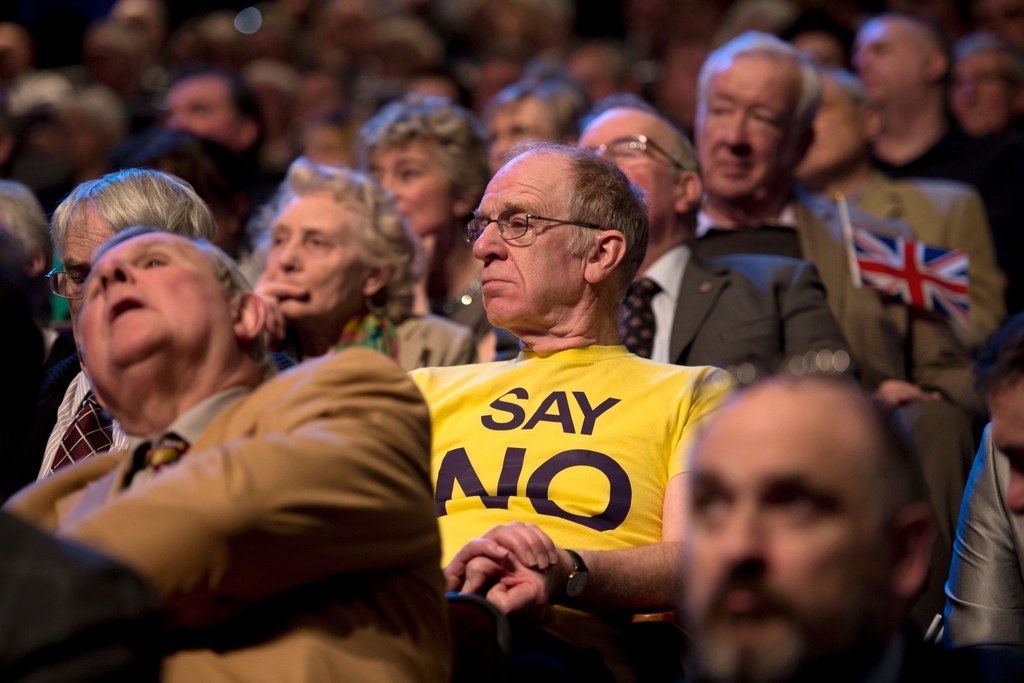
Steve Crowther, UKIP’s chairman, says the GO task forces are essential because the non-UKIP branding attracts support from other parties. He tells the conference that many Tory councillors are angry at their local Tory MPs for backing Cameron in calling for Britain to stay in the EU. "What we’re doing is we’re using GO to cut away the councillors,” he says.
“They won’t come to a UKIP meeting to get involved in this – but we’ll be using GO, having a GO task force meeting, and saying, ‘This is your opportunity, branded in no way that is threatening to you, to come along and express your political opinion without doing anything against the Conservative MP.' That’s why the GO task forces are such a good idea."
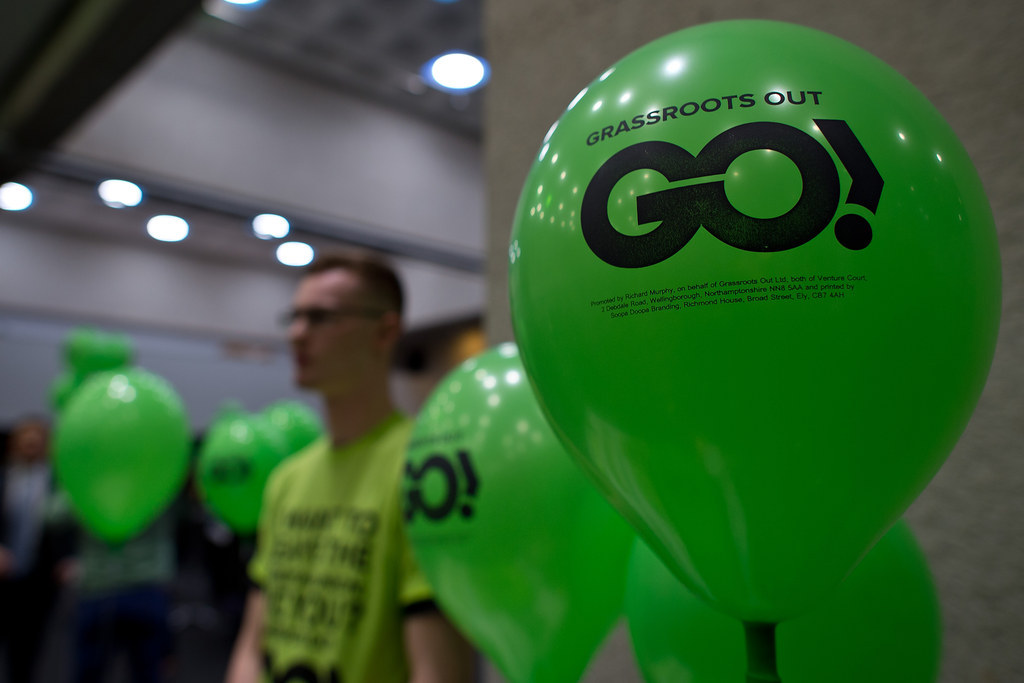
The formal start of GO's referendum campaign will be on 7 May, two days after the local elections. This will be known as the “First 96 Hours Campaign”. Essentially, Murphy says, this will be four massive action days in a row. The idea is to “set the pace” and build momentum.
“Not only does it boost the morale of our supporters, it really puts the Stay side on the back foot,” says Murphy. "They will get really depressed because they will not be organised in the same way. So we want big presences at bus stations, rail stations, shopping centres, balloons, street stalls, leaflets, whatever it is, just a lot of noise and fuss."
UKIP members are then urged to put 22 June – the eve of the referendum – into their diaries and those of their family and friends. "We’re going to blitz this country like no blitz ever before!” says Murphy. "Well almost…” Activists in the hall laugh at his faux pas. He quickly moves on, urging members to carry out “dawn raids” on the morning of 23 June by delivering leaflets before people get up and go to work. “That does have a massive influence, I can tell you from experience,” Murphy adds.
Organisers also want to see a GO teller in every single polling station on the day. One in eight people who vote in British general elections make up their minds once they’re in the booth, Murphy says. “How many Stay tellers do you think there will be outside polling stations? I don’t think there will be very many. So let’s have people, hopefully in a nice green Leave rosette, in every damn polling station. Because if they make up their mind and see a Leave teller and they’ve seen a whole lot of Leave posters, that could be crucial."
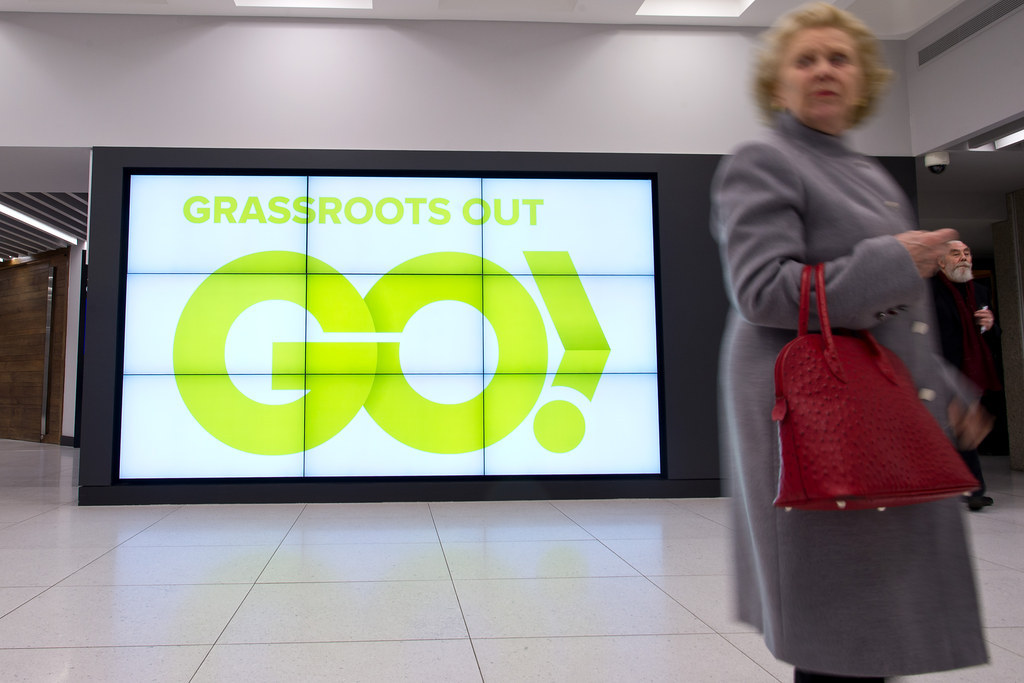
Meanwhile in London, the “air campaign” will try to win the media war while telephone surveying will aim to boost campaigning at a local level. Flack admits that GO’s infrastructure is lacking at the moment. "There will be a better website within a week or two, there will be more contact numbers, there will be more staff to answer the phones,” he says. "We are building in a matter of weeks what it’s taken other parties years and decades to build."
A man at the back of Venue Cymru puts his hand up. “Will there be theme music?” he asks. “I’d like to suggest 'Go Now' by the Moody Blues.” The hall chuckles politely. A woman stands up to point out that blockbuster movie Independence Day 2 is coming out on 24 June, and there will be £100 million of publicity in the three weeks beforehand. "We should use it to our advantage,” she says sagely.
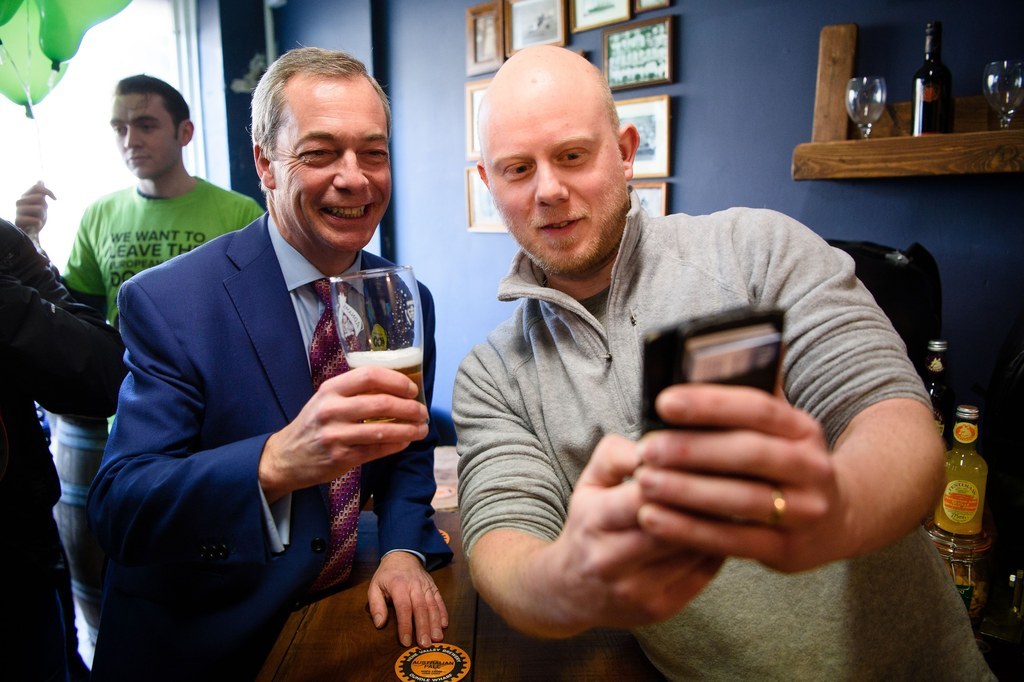
Another person asks whether GO will change its name if it wins the designation. Murphy says: "My own view for the name is just Leave, full stop. I want ‘leave' to be the most recognisable word in the English language on 23 June.”
Meanwhile Crowther urges members not to get bogged down in debates about what Britain will look like after Brexit. "We are not going to describe the process by which we will negotiate our exit any time soon,” he says.
"Because the Remainers have got nothing to go on right now. I mean their campaign’s pathetically thin. And what we don’t want to do is give them something and have them picking over it like a carcass. So we don’t need to worry about any of that stuff, about how we get out. We just are the fifth-largest economy in the world, we do a massive amount of business with the EU. And the day after we’re out, we will go on doing it."
